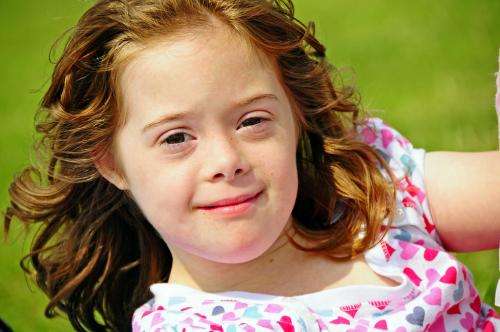Down syndrome teens need support, health assessed

Young adults with Down syndrome experience a range of physical and mental health conditions over and above those commonly reported in children with the condition—and these health problems may significantly impact their daily lives, according to recent research.
The collaborative study between the Telethon Kids Institute, Curtin University and the University of Queensland also found these young people often experience multiple conditions, and that mental health conditions were almost four times more prevalent in these young adults than in those from the general WA population.
Professor Helen Leonard from the Telethon Kids Institute says previous research had only investigated medical conditions in children and adults with Down syndrome, rather than in adolescents and young adults.
"As part of our study on the transition of young people with Down syndrome from school to adulthood, we had the opportunity to ask families about the medical conditions experienced by young adults and the impact they had on their lives," she says.
"Being able to look at the patterns of health by age provides important information both for families and primary care providers."
Questionnaire data collected in 2011 from 197 parents of young adults with Down syndrome investigated the medical conditions experienced by their children over the previous 12-months.
The researchers found the young adults experienced significant musculoskeletal (61%), overweight and obesity (57%), skin (56%), mental health (32%), and thyroid (25%) conditions, in addition to the health problems commonly experienced by children with this disorder such as eye and vision (73%), ear and hearing (45%), respiratory (36%) and cardiac (25%) conditions.
Moreover, these young people experienced concurrent conditions—four on average—and almost one-third experienced mental health problems, representing a four-fold increased prevalence than the general population.
"Females experienced more medical issues than males, even after excluding menstrual problems which were reported to affect 58 per cent," Prof Leonard says.
"Many, around one third, of parents reported these health issues impacted the young person's daily life."
"There was considerable concern about the young person's employment opportunities, mobility, participation in social and leisure opportunities including physical activity, as well as safety concerns."
Prof Leonard says these results indicate a clear need for young adults with Down syndrome to see their GPs regularly.
The researchers will develop recommendations for primary healthcare providers including early intervention prevention strategies.
They'd also like to see research around the prevalence, predictors and impact of mental health conditions in people with Down syndrome.
More information: Pikora TJ, Bourke J, Bathgate K, Foley K-R, Lennox N, et al. (2014) "Health Conditions and Their Impact among Adolescents and Young Adults with Down Syndrome." PLoS ONE 9(5): e96868. DOI: 10.1371/journal.pone.0096868




















